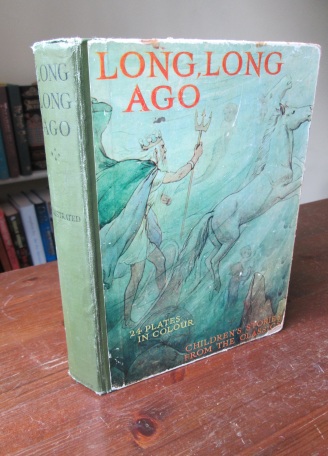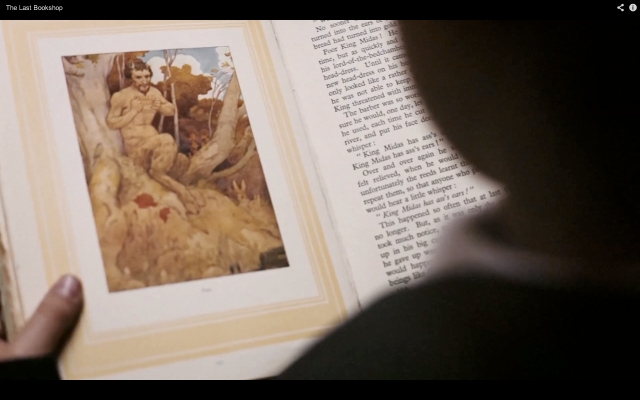You might recognise this book from our film, where it plays the pivotal role of being the first real book that the Boy has ever encountered.
I bought Long Long Ago (published 1939) from Hall’s bookshop, selecting it specifically for its attractiveness as a prop. The inscription on the inside cover reads ‘To Jill, on her 9th birthday with love and Best wishes Mummie and Daddy‘ and is dated April 26th 1941.
A birthday present in the middle of wartime.
I find this book quite moving. I wonder what became of Jill, where she lived, and whether she treasured this volume of “stories from the classics, retold by Blanche Winder.” Certainly it’s in pretty good condition for its age, with no scribblings or missing pages. If Jill was born on April 26th 1932, that means last week would have seen her 81st birthday. I wonder if she’s still alive, and if she remembers this book?
The book has lovely evocative illustrations by Harry G. Theaker. The kind of thing that puts you in mind of pre-war advertisements. I particularly wanted the illustration of Pan to be seen on screen as it is my favourite in the book, and it immediately conjured the magnificent Piper at the Gates of Dawn from The Wind in The Willows – a mesmerising chapter in possibly the greatest children’s book of all.
It was only when we got to the editing stage, and the footage was paused on the above frame that I realised something rather striking about this page. Allow me a digression…
When I was a child, my primary school in Birmingham would occasionally host musical stories told by a chap with an accordion and a moustache and a vibrant waistcoat. His name was Mr Fowler as I recall. Perhaps his most oft-repeated story involved a barber who attended to a Sultan’s haircut. The barber was sworn to secrecy because under the Sultan’s turban, he had enormous ears like a donkey – a fact about which he was very sensitive. The Sultan threatened the barber with execution if ever the secret became known. The barber, unable to keep this secret to himself, eventually ran off into the forest and spoke it aloud to the trees. The problem was, the trees were listening…
When the trees were chopped down, their wood was used to make instruments for the court musicians. As the musicians played, the sounds of those instruments started telling everyone that the Sultan had ass’s ears! I forget precisely how the story ended, except that the moral was the Sultan needn’t have worried because he was accepted by his subjects despite his donkey ears.
This story has resurfaced a couple of times in my mind during the twenty odd years since I first heard it, sitting cross-legged on the dusty parquet flooring of our assembly hall (now demolished). I came to the conclusion that it must be a variation on an ancient myth. However, I never did study Classics, so have remained in the dark for all these years as to the story’s origin.
And so it was like a lightning bolt from my past when, mid-edit, I suddenly noticed that the text on the page opposite Pan reads “King Midas has ass’s ears!”
It’s difficult to articulate why this simultaneously seemed so appropriate and yet so startling. I had browsed shelves and shelves of books, before selecting this one. I had chosen the illustration of Pan because I thought it would look best on camera. But also, I suppose, because I was trying to evoke a feeling of nostalgia within myself. I was trying to put myself in the right frame of mind to guide the scene, aiming for an atmosphere, a feeling, in the hope that this feeling might somehow leak out of the film and resonate with the audience. And, as I mentioned above, the picture of Pan made me think of the magic of The Wind in The Willows, and my nostalgia for that book.
But in my attempt to conjure up this childhood nostalgia, it seems I had performed exactly the necessary ritual to magically unearth a completely unrelated, and forgotten piece of my childhood and cast it in a new light. I suddenly knew the answer to the origin of Mr Fowler’s story. It was from the legends of King Midas.
UPDATE: Since writing this blog post, it seems Jill has been positively identified. My thanks to Tim in the comments below, who astounded me by so quickly providing a candidate. I think we can reasonably conclude that the Jill that Tim suggested is indeed the original owner of my copy of Long Long Ago. And what a very interesting woman she was…
I had been imagining Jill, 9 years old, sitting out in an air raid shelter in England, perhaps even in Kent (maybe she had been evacuated there?) with her copy of Long Long Ago open on her lap, reading about King Midas as the Luftwaffe droned overhead. But no.
As Tim pointed out, the mystery word ‘abodan’ was in fact Abadan – a city in Persia, now Iran. And it was in Abdadan on the 26th April 1932, that Jill Rigden was born. Her father, Horace Walter Rigden managed the Anglo-Persian oil refinery. Indeed, the Abadan oil refinery was built in 1912, and is one of the world’s largest.
Jill was living in Abadan in late 1939, and her father remained in charge of the refinery throughout the Second World War, but it seems she was at some point evacuated to South Africa. This casts an interesting emphasis on the fact that ‘Abadan’ is noted in the inscription. Were the family all still living together in 1941? Or – perhaps more likely – was the inscription written in Persia, before the book could be sent the great distance ready for Jill to unwrap, far away in South Africa, on her 9th birthday?
Either way, it seems my book is extremely well travelled. Jill must have brought it with her when she eventually moved to England, keeping it her whole life.
I had speculated that the original owner of Long Long Ago may well have treasured this book of mythology. But that was when I was still imagining a small girl growing up on this distant drizzly isle. Now I know that Jill in fact grew up right in the very centre of the world’s oldest civilisations. Not only that, but it seems she had a fascination with history.
Jill studied Art History in London, got a PhD and became an authority in architecture. Her supervisor was Nikolaus Pevsner – a name that immediately leaps out to anyone such as myself, with an enthusiasm for architecture (Pevsner authored a series of influential guidebooks on the architecture of the British Isles between 1951 and 1974, which provide a county-by-county breakdown of buildings he considered noteworthy).
By 1994, Jill was elected Vice-chairman of the Victorian society. She wrote defining texts on the 19th century architects Anthony Salvin and George Devey, and was a founder of the Mausolea and Monuments Trust which helps conserve architecturally significant monuments.
So, how can we be so certain that this Jill and my Jill are the same? Well I can’t imagine there were many girls called Jill born on that exact date who have a connection to Abadan. Furthermore, it seems Jill Allibone (nee Rigden) died in the Tunbridge Wells area of Kent in 1998. And, of course, I bought my book from Hall’s Bookshop in Tunbridge Wells.
I must say thank you once again to Tim, who has revealed to me the history of my book, and its original owner, and proven it to be far more interesting than I ever imagined. All of which leaves me thinking – was Jill’s love of history and the past inspired, at least in part, by her memories of childhood myths of Long Long Ago..?
FURTHER UPDATE: We have made contact with Jill’s son-in-law, Charles Wagner, via the Mausolea and Monuments Trust. Charles was able to confirm that Jill’s three daughters recognise the inscription, and that my book surely came from their mother’s huge personal library. The extraordinary and unexpected story of my book ‘Long Long Ago’ is tidily and satisfactorily drawn to its close.





This is fantastic; nothing will ever beat paper books and the stories they carry. I absolutely loved the film, by the way, and have sent it to everyone I know!
Thank you Emily. We are very grateful to people like yourself kindly spreading word of the film. And you’re quite right: ebooks and paper books are both good valid media for transmitting stories, but no ebook can have a life the way a real book has a life.
Could the word be abodar? P.Michelson
Sent from my iPad
Hmmm. Abodan? Abodar?
Neither word means anything to me. I’ve stuck both terms into search engines and got no leads.
I suppose the question is, what would one write after the dedication, but before the date? The place? Could it be a house name?
‘Abraham’, perhaps?
Thank you for the story, by the way!
Sir, I do believe I have just discovered your ‘Jill’! http://www.sal.org.uk/obituaries/Obituary%20archive/jill-allibone It says that she was born in Abadan, Iran! That must be the word – ‘Abadan’! Sadly, it seems she passed away in 1998.
Wow Tim I’m staggered you found her! I can’t imagine how you did that so quickly.
I’m convinced you’ve found the right person. I’m sad to learn she has died, but delighted to learn her story. All I can say is thank you very much, and I’m off to write a lengthy update to this post…
You’re very welcome indeed! I hadn’t expected to find her that quickly either, so I hope it didn’t spoil any of the fun of the hunt for you. But I love a good puzzle, and along with a little help from the magic of the internet, now you have your answer! And yes, what an interesting life recovered from the pages of history. It was fascinating for me as well. Thanks again for your wonderful short film which led me to this website in the first place.
Best wishes with your future endevours.
Such a marvellous tale of inspiration from your school days, but I am absolutely speechless that Tim has managed to round the story off! I can only think that he must work part-time at GCHQ.
I notice that Tim hasn’t denied working in government intelligence!
Have you thought of perhaps contacting one of Jill’s surviving relatives? Or perhaps a local newspaper in Tunbridge Wells? I’m sure they would love to know about this story. (This idea was suggested to me by a friend).
A nice idea. I wonder if there are any publications either local to Kent or connected to history/books which might be interested in running the story? I’ll have a look around. And tell your friend thanks!
Is this book available to buy ..Long long ago was my mum’s favourite as a child but lost now would love to buy it for her
Hi Julie,
Apologies for my delay in replying to your comment. Now the blog is less active I sometimes go a while without checking it.
Perhaps by now you will have sourced a copy of Long Long Ago for your mother from a lovely local independent bookshop. If not, sticking “Long Long Ago, Blanche Winder” into a search engine reveals there are several copies available.
Oxfam’s website currently has one listed for £17.99
Or (if you can bear the irony of buying a book you saw in our film via Gamazone… er, I mean Amazon) the same version as seen in our film is available there for under a tenner.